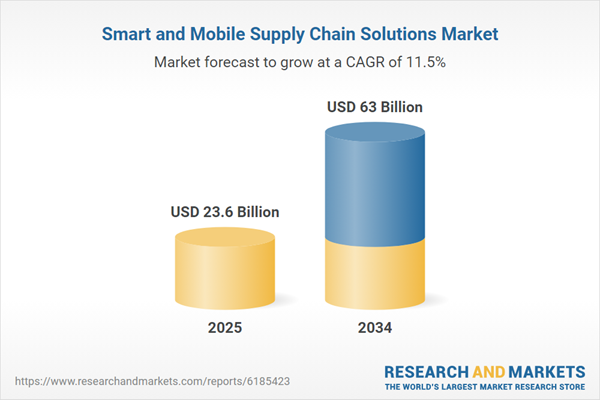The smart and mobile supply chain solutions market has become a critical enabler of resilience, transparency, and agility in the global logistics ecosystem. These solutions leverage advanced technologies such as IoT, AI, cloud computing, blockchain, and mobility tools to transform traditionally siloed and reactive supply chains into connected, data-driven networks. From real-time inventory tracking and predictive demand planning to last-mile delivery optimization and supplier collaboration platforms, smart and mobile supply chain systems enable companies to respond rapidly to disruptions and shifting market conditions. The growing need for just-in-time delivery, omnichannel retail, and integrated procurement strategies has fueled adoption across industries including manufacturing, retail, healthcare, and automotive. In addition, increasing consumer expectations around delivery speed, accuracy, and visibility have pushed businesses to embrace mobile-enabled logistics tools and intelligent platforms that offer end-to-end supply chain orchestration. With digital transformation now seen as a competitive imperative rather than a choice, smart and mobile supply chain solutions are shaping the next generation of operational excellence.
The smart and mobile supply chain solutions market witnessed accelerated innovation and widespread enterprise adoption. Businesses responded to lingering global disruptions - including geopolitical tensions, raw material shortages, and climate-related events - by enhancing their supply chain visibility and resilience through technology. Real-time tracking and telematics became standard features in logistics operations, with companies using mobile apps and IoT sensors to monitor shipments across geographies and temperature-sensitive goods in transit. AI-powered platforms were deployed to analyze procurement risks, forecast demand fluctuations, and optimize warehouse layouts in real time. Cloud-native supply chain management systems saw a surge in uptake due to their scalability, ease of deployment, and integration with ERP and CRM platforms. Meanwhile, sustainability emerged as a strategic driver, with firms adopting carbon tracking dashboards and green route planning tools to meet environmental goals. Mobile-first tools empowered frontline workers with instant access to inventory data, digital workflows, and issue resolution protocols, significantly improving responsiveness and reducing downtime. These developments highlighted the growing maturity and strategic importance of intelligent supply chain ecosystems.
The smart and mobile supply chain solutions market is expected to evolve toward more autonomous, predictive, and sustainable models. The use of digital twins for end-to-end supply chain simulation will gain traction, enabling businesses to model scenarios, assess risk, and test new configurations before real-world deployment. Edge computing will be increasingly integrated with IoT networks to allow local processing of data at warehouses, ports, and distribution centers, reducing latency and enhancing responsiveness. Machine learning algorithms will become more advanced in detecting anomalies, automating procurement decisions, and mitigating disruptions before they occur. The convergence of mobile technology with augmented reality (AR) and voice interfaces will further streamline picking, packing, and inventory tasks on the ground. Regulatory compliance and ESG reporting will also drive the adoption of traceability solutions using blockchain and smart contracts to authenticate the source and journey of products. As global supply chains become more interconnected and complex, businesses will need agile, mobile-first tools that offer transparency, collaboration, and control - transforming logistics from a cost center into a competitive differentiator.
Key Insights: Smart and Mobile Supply Chain Solutions Market
- Adoption of Real-Time Shipment Visibility Platforms: Companies are prioritizing real-time visibility through GPS, RFID, and telematics to monitor shipment status, reduce delays, and enhance customer satisfaction across multimodal transportation networks.
- Integration of AI in Demand Forecasting: AI-driven platforms are helping businesses predict demand with greater accuracy by analyzing historical data, market trends, and external factors such as weather or geopolitical events.
- Expansion of Mobile-Enabled Warehouse Management: Mobile applications are streamlining warehouse operations, giving staff real-time access to inventory, task assignments, and performance metrics while reducing paper-based inefficiencies.
- Growth in ESG-Compliant Supply Chain Tools: With growing regulatory and stakeholder pressure, firms are adopting digital tools to track emissions, manage supplier compliance, and implement more sustainable logistics strategies.
- Rise of Digital Twin Technology: Virtual replicas of supply chains are being used to simulate disruptions, optimize flows, and test strategic decisions, offering greater control and foresight in dynamic environments.
- Need for Supply Chain Resilience: Continued disruptions from pandemics, geopolitical tensions, and climate risks are pushing businesses to adopt technology that enhances visibility, agility, and risk mitigation across the supply chain.
- Rising Consumer Expectations for Speed and Transparency: As customers demand faster deliveries and real-time updates, businesses are turning to smart logistics tools that improve accuracy, visibility, and responsiveness throughout the fulfillment process.
- Globalization and Complexity of Supply Networks: Increasingly complex global supply chains require integrated platforms to manage diverse vendors, shipping modes, and compliance requirements across borders.
- Cost Reduction and Operational Efficiency Goals: Companies are investing in intelligent supply chain solutions to reduce waste, optimize route planning, and improve workforce productivity, ultimately lowering operating costs.
- Integration with Legacy Systems: Many organizations struggle to connect modern supply chain tools with outdated ERP and warehouse systems, creating data silos and limiting the real-time visibility and automation potential of advanced solutions.
Smart and Mobile Supply Chain Solutions Market Segmentation
By Solution
- Transportation Management Systems (TMS)
- Warehouse Management Systems (WMS)
- Sourcing and Procurement
- Supply Chain Planning (SCP)
- Manufacturing Execution Systems (MES)
By Enterprise Size
- Small and Medium Enterprises
- Large Enterprises
By End-User
- Retail and Consumer Goods
- IT and Telecom
- Manufacturing
- BFSI
- Government
- Energy and Utilities
- Healthcare
- Transportation and Logistics
- Other End-Users
Key Companies Analysed
- SAP SE
- Oracle Corporation
- JDA Software Group
- Manhattan Associates Inc.
- Epicor Software Corporation
- International Business Machines Corporation (IBM)
- The Descartes Systems Group Inc.
- Blue Yonder Group Inc.
- Infor
- Magaya Corporation
- Dassault Systèmes
- Körber AG
- Honeywell International Inc.
- Logility Inc.
- Kinaxis Inc.
- GT Nexus Inc.
- E2open LLC
- BluJay Solutions
- Elemica Inc.
- One Network Enterprises
- Amber Road Inc.
- LeanLogistics Inc.
- MercuryGate International Inc.
- Transplace Inc.
- Freightgate Inc.
- Shipwell Inc.
- FourKites Inc.
- project44 Inc.
- Loadsmart Inc.
- Convoy Inc.
Smart and Mobile Supply Chain Solutions Market Analytics
The report employs rigorous tools, including Porter’s Five Forces, value chain mapping, and scenario-based modeling, to assess supply-demand dynamics. Cross-sector influences from parent, derived, and substitute markets are evaluated to identify risks and opportunities. Trade and pricing analytics provide an up-to-date view of international flows, including leading exporters, importers, and regional price trends.
Macroeconomic indicators, policy frameworks such as carbon pricing and energy security strategies, and evolving consumer behavior are considered in forecasting scenarios. Recent deal flows, partnerships, and technology innovations are incorporated to assess their impact on future market performance.Smart and Mobile Supply Chain Solutions Market Competitive Intelligence
The competitive landscape is mapped through proprietary frameworks, profiling leading companies with details on business models, product portfolios, financial performance, and strategic initiatives. Key developments such as mergers & acquisitions, technology collaborations, investment inflows, and regional expansions are analyzed for their competitive impact. The report also identifies emerging players and innovative startups contributing to market disruption.
Regional insights highlight the most promising investment destinations, regulatory landscapes, and evolving partnerships across energy and industrial corridors.Countries Covered
- North America - Smart and Mobile Supply Chain Solutions market data and outlook to 2034
- United States
- Canada
- Mexico
- Europe - Smart and Mobile Supply Chain Solutions market data and outlook to 2034
- Germany
- United Kingdom
- France
- Italy
- Spain
- BeNeLux
- Russia
- Sweden
- Asia-Pacific - Smart and Mobile Supply Chain Solutions market data and outlook to 2034
- China
- Japan
- India
- South Korea
- Australia
- Indonesia
- Malaysia
- Vietnam
- Middle East and Africa - Smart and Mobile Supply Chain Solutions market data and outlook to 2034
- Saudi Arabia
- South Africa
- Iran
- UAE
- Egypt
- South and Central America - Smart and Mobile Supply Chain Solutions market data and outlook to 2034
- Brazil
- Argentina
- Chile
- Peru
Research Methodology
This study combines primary inputs from industry experts across the Smart and Mobile Supply Chain Solutions value chain with secondary data from associations, government publications, trade databases, and company disclosures. Proprietary modeling techniques, including data triangulation, statistical correlation, and scenario planning, are applied to deliver reliable market sizing and forecasting.Key Questions Addressed
- What is the current and forecast market size of the Smart and Mobile Supply Chain Solutions industry at global, regional, and country levels?
- Which types, applications, and technologies present the highest growth potential?
- How are supply chains adapting to geopolitical and economic shocks?
- What role do policy frameworks, trade flows, and sustainability targets play in shaping demand?
- Who are the leading players, and how are their strategies evolving in the face of global uncertainty?
- Which regional “hotspots” and customer segments will outpace the market, and what go-to-market and partnership models best support entry and expansion?
- Where are the most investable opportunities - across technology roadmaps, sustainability-linked innovation, and M&A - and what is the best segment to invest over the next 3-5 years?
Your Key Takeaways from the Smart and Mobile Supply Chain Solutions Market Report
- Global Smart and Mobile Supply Chain Solutions market size and growth projections (CAGR), 2024-2034
- Impact of Russia-Ukraine, Israel-Palestine, and Hamas conflicts on Smart and Mobile Supply Chain Solutions trade, costs, and supply chains
- Smart and Mobile Supply Chain Solutions market size, share, and outlook across 5 regions and 27 countries, 2023-2034
- Smart and Mobile Supply Chain Solutions market size, CAGR, and market share of key products, applications, and end-user verticals, 2023-2034
- Short- and long-term Smart and Mobile Supply Chain Solutions market trends, drivers, restraints, and opportunities
- Porter’s Five Forces analysis, technological developments, and Smart and Mobile Supply Chain Solutions supply chain analysis
- Smart and Mobile Supply Chain Solutions trade analysis, Smart and Mobile Supply Chain Solutions market price analysis, and Smart and Mobile Supply Chain Solutions supply/demand dynamics
- Profiles of 5 leading companies - overview, key strategies, financials, and products
- Latest Smart and Mobile Supply Chain Solutions market news and developments
Additional Support
With the purchase of this report, you will receive:- An updated PDF report and an MS Excel data workbook containing all market tables and figures for easy analysis.
- 7-day post-sale analyst support for clarifications and in-scope supplementary data, ensuring the deliverable aligns precisely with your requirements.
- Complimentary report update to incorporate the latest available data and the impact of recent market developments.
This product will be delivered within 1-3 business days.
Table of Contents
Companies Mentioned
- SAP SE
- Oracle Corporation
- JDA Software Group
- Manhattan Associates Inc.
- Epicor Software Corporation
- International Business Machines Corporation (IBM)
- The Descartes Systems Group Inc.
- Blue Yonder Group Inc.
- Infor
- Magaya Corporation
- Dassault Systèmes
- Körber AG
- Honeywell International Inc.
- Logility Inc.
- Kinaxis Inc.
- GT Nexus Inc.
- E2open LLC
- BluJay Solutions
- Elemica Inc.
- One Network Enterprises
- Amber Road Inc.
- LeanLogistics Inc.
- MercuryGate International Inc.
- Transplace Inc.
- Freightgate Inc.
- Shipwell Inc.
- FourKites Inc.
- project44 Inc.
- Loadsmart Inc.
- Convoy Inc.
Table Information
| Report Attribute | Details |
|---|---|
| No. of Pages | 160 |
| Published | October 2025 |
| Forecast Period | 2025 - 2034 |
| Estimated Market Value ( USD | $ 23.6 Billion |
| Forecasted Market Value ( USD | $ 63 Billion |
| Compound Annual Growth Rate | 11.5% |
| Regions Covered | Global |
| No. of Companies Mentioned | 30 |









